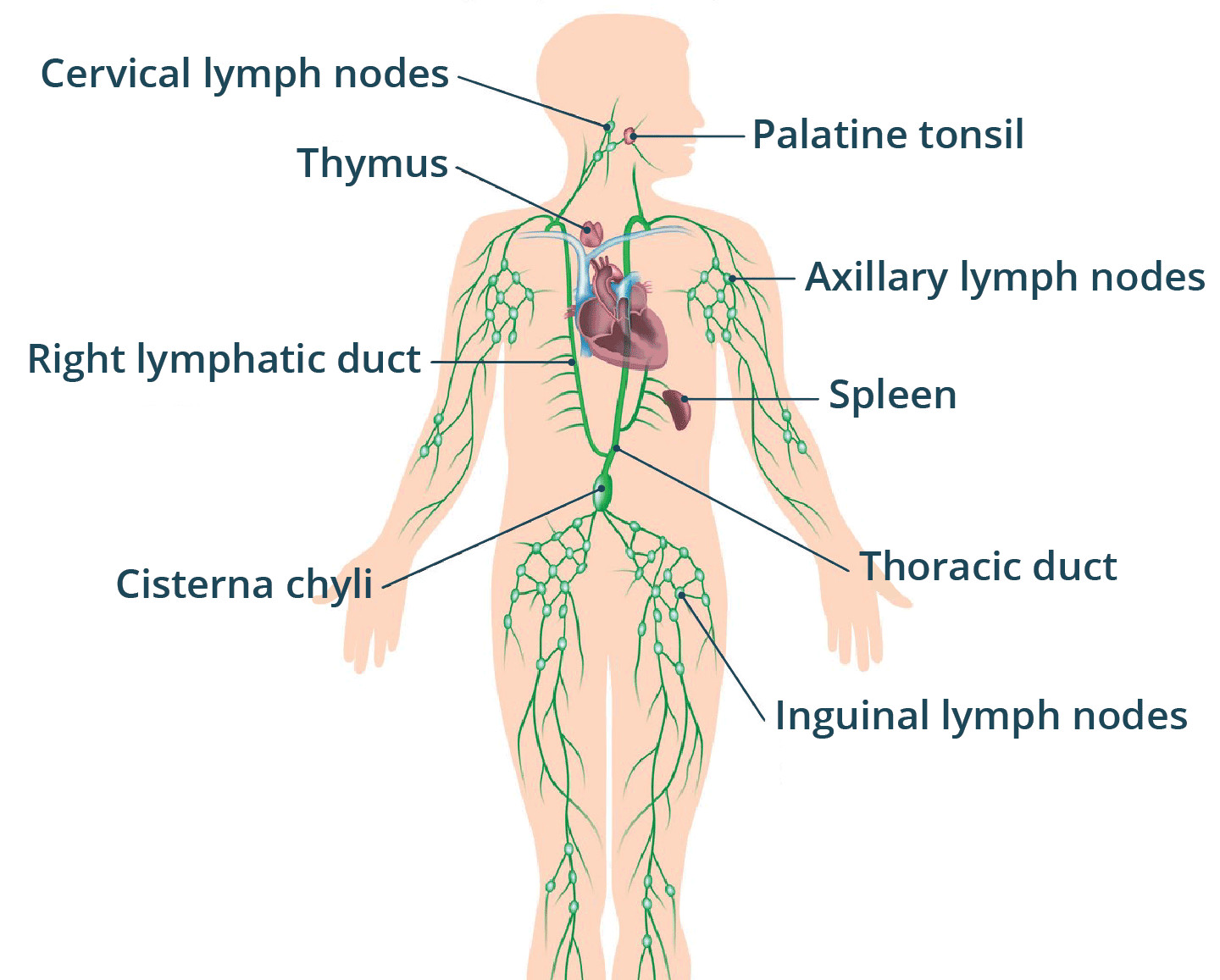Lymph nodes are a crucial component of your body’s immune system, acting as filters and defenders against infection and disease. Often referred to as lymph glands, these small, bean-shaped tissues are strategically positioned throughout your body, including the neck. Understanding where lymph nodes are located in your neck, also known as the cervical lymph nodes, is important for recognizing potential health issues.
What are Lymph Nodes and Their Role?
Lymph nodes are integral to the lymphatic system, a network of vessels and tissues that plays a vital role in immunity. They contain white blood cells, called lymphocytes, which are essential for fighting off infections. Lymph nodes filter lymph fluid, a clear fluid circulating throughout the body that collects waste products, bacteria, and viruses. As lymph fluid passes through the nodes, lymphocytes identify and destroy harmful substances, preventing infections from spreading. When your body is fighting an infection, the lymph nodes near the affected area may swell as they work harder to combat the invaders.
Locating Lymph Nodes in Your Neck
The neck region is rich in lymph nodes, collectively known as cervical lymph nodes. These nodes are organized into groups and chains, located in various areas of the neck to effectively drain lymph fluid from the head and neck region. Here’s a breakdown of the main locations:
Anterior Cervical Lymph Nodes
These nodes are situated at the front of your neck. They can be further subdivided into superficial and deep groups:
- Superficial anterior cervical nodes: Located along the external jugular vein, these nodes drain the skin and superficial tissues of the anterior neck.
- Deep anterior cervical nodes: These nodes are found deeper in the neck, along the internal jugular vein. They receive lymph drainage from the superficial anterior cervical nodes, as well as from deeper structures of the neck, including the larynx, trachea, and thyroid gland.
Posterior Cervical Lymph Nodes
Positioned at the back of your neck, these nodes run along the posterior border of the sternocleidomastoid muscle and along the trapezius muscle. They drain lymph from the scalp, neck muscles, and posterior neck region.
Tonsillar and Submandibular Lymph Nodes
Located under the jawline, the submandibular nodes are responsible for draining lymph from the mouth, nose, cheeks, and lips. The tonsillar nodes, found near the tonsils, are part of this group and are crucial in filtering lymph from the tonsillar and pharyngeal regions.
Submental Lymph Nodes
These nodes are located beneath the chin, in the submental triangle. They primarily drain lymph from the chin, lower lip, floor of the mouth, and the tip of the tongue.
Understanding these locations can help you and your doctor identify the potential source of infection or other issues when neck lymph nodes become swollen or tender.
 Illustration of the lymphatic system showing lymph nodes throughout the body’. Lymph nodes are strategically located throughout the body, including the neck, to effectively filter lymph fluid and fight infection.
Illustration of the lymphatic system showing lymph nodes throughout the body’. Lymph nodes are strategically located throughout the body, including the neck, to effectively filter lymph fluid and fight infection.
Why are Neck Lymph Nodes Important?
Cervical lymph nodes are essential for protecting against infections and diseases in the head and neck area. They filter lymph fluid from the scalp, face, mouth, throat, and ears. When you have a cold, sore throat, or ear infection, it’s common for the lymph nodes in your neck to swell. This swelling is a sign that your immune system is actively fighting off the infection. The enlarged nodes are packed with immune cells working to eliminate pathogens and prevent the infection from spreading further into your body.
Swollen Lymph Nodes in the Neck: What Does It Mean?
Swollen lymph nodes in the neck, also known as cervical lymphadenopathy, are a common symptom, often indicating an infection or inflammation in the head or neck region. Common causes of swollen lymph nodes in the neck include:
- Viral Infections: Common colds, flu, glandular fever (mononucleosis), and measles can cause swollen lymph nodes.
- Bacterial Infections: Strep throat, tonsillitis, ear infections, and skin infections can lead to enlarged cervical lymph nodes.
- Other Infections: Tuberculosis and cat scratch disease are less common infections that can also cause lymph node swelling.
- Autoimmune Conditions: In some cases, autoimmune diseases like lupus and rheumatoid arthritis can cause generalized lymph node swelling, including in the neck.
While swollen lymph nodes are often a sign of your body fighting off an infection, it’s important to consult a doctor if:
- The swelling is persistent and lasts for more than a few weeks.
- The nodes are very large, hard, or fixed in place.
- You experience other symptoms like fever, night sweats, unexplained weight loss, or persistent fatigue.
Lymph Nodes in Neck and Cancer
In rare cases, swollen lymph nodes can be a sign of cancer. Cancer can spread to lymph nodes from a nearby tumor, or lymphoma can begin in the lymph nodes themselves. If cancer is suspected, doctors may perform a biopsy of the lymph node to determine the cause of the swelling. Examining the cervical lymph nodes is also important in staging certain cancers, as it can indicate whether the cancer has spread beyond its primary site.
Conclusion
Lymph nodes in the neck are vital components of your immune system, working diligently to protect you from infections and diseases. Understanding their location and function can empower you to be more aware of your health. While swollen lymph nodes in the neck are often a normal response to infection, it’s essential to pay attention to any persistent or concerning changes and seek medical advice when necessary. Being informed about your cervical lymph nodes contributes to proactive health management and allows for timely medical attention when needed.
